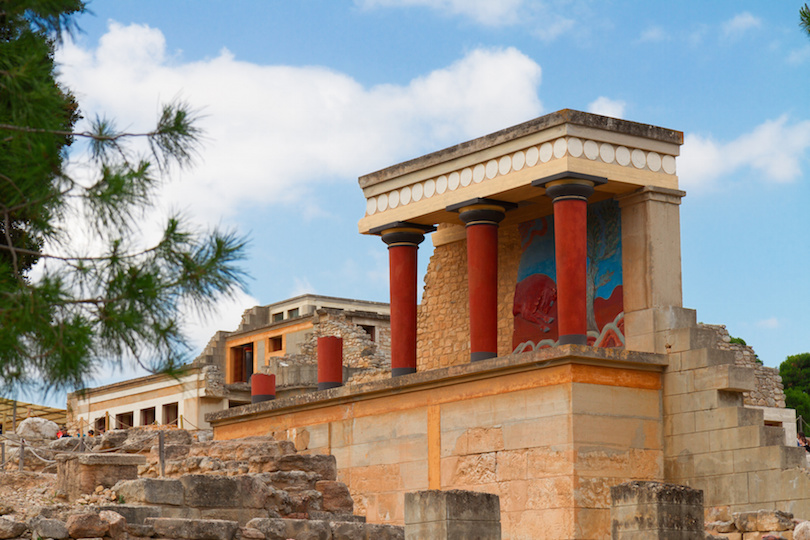Cannon Omake: For The Long Night Ahead
- Pronouns
- He/Him

Mycenae, June 14 A.E
The main meeting room for the Central Committee was a strange place to be at night. The coal gas lights made it light enough to see but they could only do so much, leaving parts of the room shrouded in darkness, various features casting long shadows across the table. Then there was quiet. The city didn't sleep at night anymore, not like it did before the revolution, but it was still so much quieter than Tucson had ever been.
Aitana Freixa may have liked Mycenae far more than the Old Pueblo, but even now, the quiet that nighttime brought unsettled her. Tonight, the quiet felt like the calm before a raging storm.
The Chairwoman had called an emergency meeting of the Central Committee, the specifics were unknown but it didn't take a mind reader to figure out it was about the Air Force. News about New Monthan's invasion of Wilusa had reached the popular Republic a couple of weeks prior. It had been a painful bit of news, the National Democratic Front weren't the most committed to a proper revolution, but they rid the world of the last major remnants of the USA's horrific police system, they were heroes for that if nothing else. New Monthan had ensured they would never get a proper chance to celebrate that win.
The room was relatively empty still, late night meetings, even emergency ones, weren't the easiest thing to arrange, particularly when parts of the Committee were out of town at the moment. Besides Aitana, there were five others in the room.
Sean Gordon sat across from her, his head propped up by one hand in an effort to fight his tiredness. Minister of Military Development, Sophie McDonald, sat next to him. She was far more awake, shifting uncomfortably in her seat, her hand occasionally reaching towards the fresh set of stitches across her head before forcing her hand back down.
Evan Manning, Minister of Finance, sat far away from any of the three, diligently cleaning her glasses before returning them to her face. Normally having the leader of the Maoists, Moderates and Intensificationists all in one room was asking for at least a few rounds of arguments but they were all too uneasy and too tired to do much more than occasionally glare at each other.
Orestes, son of Alektruon, and Commander Elaine Mathis were by the windows, Mathis pacing back and forth as Orestes watched the door stoically. Mathis technically was just an observer for the Central Committee but as Commander of the Home guard, Mathis generally made a point to attend when she could. Something which Freixa always found a bit annoying,
Commander Mathis was loyal, nearly a decade of service had proven that, but everyone knew Mathis was no revolutionary at heart. The moderates were bad enough but allowing a closested liberal to have a voice in the Committee, even a small one, was at best a slide back into the Barker years, at worst it was a betrayal of the revolution.
Tonight though, Freixa was quietly grateful for Mathis's presence. Whatever this meeting was about, it likely concerned the military, and if nothing else Mathis would provide a dissident voice against Gordon that the Chairwoman might listen to.
After a few minutes, Sophie Shaw stormed into the room, a bundle of folders in one hand and a large paper bag in the other. Minister Colin Wong followed shortly behind, along with a woman in a distinct blue suit, only a few frayed bits around the collar marked the otherwise intact outfit. A number of medals were attached to her chest.
The sight of the woman caught everyone's attention and made Freixa stand up, even in the low light it was obvious she was Air Force.
"Everyone please take a seat," Chairwoman Shaw said calmly, "I'll explain I'll guest in a moment."
Aitana and the others quickly took their seats, though Aitana's eyes remained fixed on the Air Force Officer. She was short, with sharp features and short black hair. She wasn't chained, and she didn't look nervous. She wasn't a prisoner, so why was she here?
"Is this it?" Shaw looked around, disappointment etched on her face.
"It's all we could muster on such short notice," Gordon explained.
"No matter," Shaw said dismissively, "I'll brief them when they arrive, not like I'm going to have much sleep tonight anyways."
"Less than two hours ago, Officer Marjorie Brown of USAF Western Command, stepped off of a Naxos trade vessel and into the office of Minister Wong, offering to defect" she explained.
That was certainly a big deal, Air Force defections were rare, indeed the last major one that Aitana had heard about nearly caused a war between Naxos, Crete and the Air Force. But that couldn't be the only reason Shaw called this meeting.
Aitana found herself growing more worried with each passing moment.
"Why would a Sky Warrior defect to us, to the Popular Republic?" Orestes asked cautiously.
"While I'm no socialist," Officer Brown spoke up, her voice full of surprising confidence, "but this republic seems like one of the few bastions of decency left in the world."
'Since when did the US Military ever care about decency?' Aitana wondered as she and the others looked on skeptically.
"More importantly,' the officer went on, "You're the only state in the region that has any chance of putting the information I have to any use."
"Officer Brown here claims to have been a member of Western Command's Intelligence division, and considering the info she's provided, I'm inclined to believe her," the Chairwoman noted as she thumbed through a folder.
"We now have a detailed overview of Western Command's little dictatorship and the myriad of factions and personal alliances that make up its command structure," she went on, "but more importantly, Marjorie here has confirmed our worst fears. Western Command's recent actions aren't just opportunistic scavenging, but signs of full blown alliance between them and the New Monthan regime."
Aitana felt her stomach clench at the Chairwoman's words. That was a Nightmare scenario, New Monthan on its own was one of the most powerful remnants of American Imperialism worth standing, allied with Western Command they'd be stronger than any one state in the entire world.
"That's impossible!" Gordon declared, "Western Command was the first to mutiny, there have been assassinations on both sides."
"And yet, High Command has agreed to put aside their differences with New Monthan's president," Officer Brown spat the word with contempt, "And participate in a joint operation to "restore order" in Western Anatolia."
"This is not just an invasion of Wilusa," Shaw added, "The Juntas are planning to invade Lesbos, the Federal Republic, New Pueblo, hell probably even the Vanguard Cultists and New Washington as well."
That would mean most of western Anatolia, and a bulk of the surviving American population, would fall under the control of a group of mass murdering religious zealots in uniforms. New Monthan would be the most powerful state on earth when the dust settled.
A question suddenly surged into Aitana's mind.
"What does Western Command get out of this?" she asked, "Are they rejoining the fold?"
Western Command was helping to make one of their biggest rivals into a major power. Either some sort of coup had brought a New Monthan puppet into power, or Western Command was getting something out of this.
"The details were still being worked out when I fled and a lot of it was being kept under wraps," Officer Brown explained, "but I believe it was a quid pro quo situation. Western Command helps with New Monthan's rivals, and in exchange New Monthan will help with Western Command's rivals."
"You mean us," Commander Mathis spoke up.
"Most likely, yes." the officer nodded, "Along with Naxos and Crete. I believe they want to divide the whole region between them."
'Well, shit,' Aitana thought.
Their war against New Arizona had proven the Popular Republic was a military force to be reckoned with, but a war against Western Command alone would not be an easy fight. Against both them and New Monthan? Well, Aitana didn't believe it was possible, followers of Mao Zedong Thought had beaten worse odds against imperialists before. But it would be a long and bloody struggle, one that would undo so much progress.
There was no shouting or cries of dismay but all around here, Aitana could hear her comrades muttering amongst themselves in worried tones. Though she noticed that Gordon and Orestes looked unconcerned.
"Are you certain they intend to target us?" Commander Mathis asked.
The officer shook her head.
"No," Brown admitted,"I was forced to flee before I could confirm anything but the sign seemed-"
"It would be my advice to operate under the assumption that we're next on the list once the invasion of Anatolia is finished," Shaw interrupted, "and you should all prepare accordingly."
Aitana began preparing mental lists.They'd have to pull resources away from light industry development, probably infrastructure and even agriculture. Military development was going to need more focus, so much more focus and energy. The goals of the Three Year Plan would have to be balanced against the military needs of the Popular Republic.
"It's not all bad news," Shaw said as she pulled her paper bag open, revealing a number of smaller round bags, tied closed with string. "I come bearing gifts as well. I was planning to save these for Gordon's birthday next week but I think we all need this right now."
Aitana stared at the bag in confusion before gently opening it, the smell was immediate and familiar. It had been years since she tasted the stuff but she had spent most of college living off the stuff.
"Coffee?" Manning questioned.
"Minister Barnett has been testing samples of the coffee trees the slavers left behind, to see if they're viable," Shaw explained, "I figured we could all use a pick me up right, we all have a long night ahead of us."
"Yes we could," Aitana agreed as she stared at the coffee grounds in front of.
Tonight would be a long night, the first of many, Aitana suspected. War lay on the horizon, not now, likely not for years, but war all the same, far bloodier and more dangerous than the wars they've already faced.
A couple cups of coffee would be nice, but it would only last her tonight. And she had a great many long nights ahead of her.
Coffee or not, Aitana would endure, she had to, the revolution demanded it.
Last edited:



